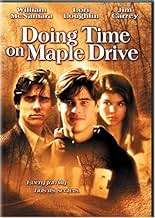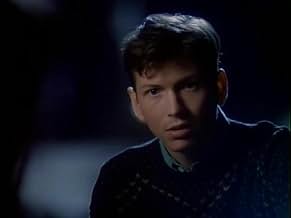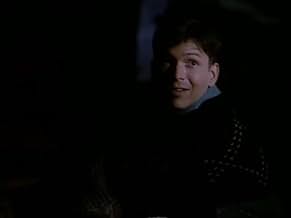Adicionar um enredo no seu idiomaA young college student, his family's "golden child," brings his fiancee home to meet them.A young college student, his family's "golden child," brings his fiancee home to meet them.A young college student, his family's "golden child," brings his fiancee home to meet them.
- Direção
- Roteirista
- Artistas
- Indicado para 3 Primetime Emmys
- 1 vitória e 3 indicações no total
- Phil Carter
- (as James B. Sikking)
Avaliações em destaque
The story and plot are well developed, as are the characters. The only thing I would've like to have seen more of was the sister and her husband. The movie hints at some serious issues (beside the one immediate one at hand) between them--which seemed oddly down-played.
Anyway, see this when it comes on cable!!
I went literally around the world before I found this film on video, having searched for five years. I am so glad that I succeeded.
For once in a movie I actually felt sorry for the people that I was meant to feel sorry for, quite a directorial achievement. Carrey's "best man" speech led everyone down the wrong track, expecting a self pitying outcome, only to be twisted into a noble speech right at the end.
This is one film that is well worth the effort of tracking it down.
"Doin' Time on Maple Drive" is a powerful film, more or less based on the syndrome of the controlling, affluent parents/children afraid of their disapproval, trying to please them and not measuring up. So it will hit home with lots of people. In fact, probably with most people.
The film is of special interest because of a supporting dramatic role by none other than Jim Carrey. He and the whole cast are excellent and ring true.
A therapist once told me, "There are no secrets in families." This movie points that up magnificently.
Doin' Time on Maple Drive is irresistible - when it's on TV, even if you've seen it, you won't be able to resist watching it again.
But viewers are alerted to the shallowness of this overall image when the story's POV character tells another character: "See, he just has to be perfect. And if he isn't perfect, just keep it to yourself because I don't think anybody in this family wants to know". As secrets and anger surface, verbal conflict builds. And by the film's end, all these people are revealed to be complex, flawed, vulnerable, and hurting.
"Doing Time On Maple Drive" gets off to a slow start. I think the script setup might be a tad too long. And the writers could have been a little clearer about who is related to whom. Other than that, the script is well written and highly thematic. With rich characterization, the story conveys a realistic view of contemporary America, with its penchant for shallow idealism that overlays deep social and psychological turmoil. Although the dialogue seems a bit dated, it nevertheless has some good subtext.
Overall acting is quite impressive. I couldn't find any weak performances. It's nice to see Jim Carrey play a serious role; I wish he would do more drama. The film's color cinematography is adequate.
I have two complaints. First, the score consists of dreary, nondescript elevator music; second, sets seem cheap. However, this is after all a made-for-TV movie; visual breaks show where the commercials were inserted. And I can imagine that the budget here was fairly low.
But the film's strength is its script. "Doing Time On Maple Drive" is a poignant story that has genuine thematic depth. For what director Ken Olin set out to do, I think he succeeded quite well. Although there have been more recent films dealing with the same general topic, the high quality of this film makes it worth watching.
I really liked this when it first aired. It hit home for me, as a gay man who contemplated suicide in my youth. Often a part of the process of accepting yourself, despite the hatred and violence inflicted on GLBT persons. A test, I suppose. Failing at that attempt is the only way to pass. Truth must prevail, even if others--including those people you hold dear--do not wish to hear it. As though listening yourself is ever that easy.
Jim Carrey was amazing in this, and should have gotten him more serious roles. "Man in the Moon" was the closest to serious that he's done since this film. I hope he does more, since comedy can only take you so far. Oscars are won for dramas, typically.
Dave
Você sabia?
- CuriosidadesFeatures an early, dramatic role by Jim Carrey.
- Citações
Tom: How does it feel, Captain?
Phil Carter: What?
Tom: How does it feel to almost lose your child? How bad does it feel?
Karen: Tom...
Phil Carter: I don't know what gotten into you, Tom, but I don't think this is none of your concern.
Tom: I'm sorry, Phil, I'm 32 years old and you don't get to decide what concerns me. See, your standard of conduct might be the sufficient reason to lose your child, but I have to draw the line when it comes to losing mine.
Phil Carter: What children? You don't have any children.
Tom: No, I don't. I don't have any children. I don't have children, because my wife would rather have an abortion without telling me--without even telling me that she's pregnant--rather than risk upsetting you by having a baby at the wrong time. You have a son who drinks himself into a stupor every night...
Tim Carter: [embarrassed by this] Oh, God, Tom!
Tom: ...you've got a daughter who's ashamed of her husband...
Karen: [cuts him desperately] I am not ashamed!
Tom: [annoyed] Who's ashamed of her husband--you're ashamed of me, Karen--and you've got another son who almost killed himself rather than tell you he's not what you think he is. And I'm not prepared to be a parent? Because I can't afford it? It's about money?
Phil Carter: Tom, we're not going to talk about this now.
Tom: No? When are we going to talk about it? When someone actually dies? Would that be better? What's the military term for it? "Acceptable losses", isn't it? Well these are not acceptable losses. I can't accept them.
Tom: [shakes his head in shame and leaves]
Tom: I can't!
- ConexõesFeatured in The 44th Annual Primetime Emmy Awards (1992)































